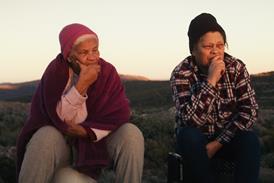Diane Kruger stars as doomed French Queen Marie Antoinette in Berlinale opening night film, Farewell My Queen (sold by Elle Driver.)
“You do set yourself up for failure a little bit,” Kruger reflects on the challenge of playing well-known historical figures. (She also starred as Helen in Wolfgang Petersen’s Troy.) “Everybody has an opinion already of what they were supposed to look like and what they were. In Marie Antoinette’s case, a lot of people judge her already.They either adore Marie-Antoinette and feel she was a poor little girl who was put into this position or…they hate her.”
Kruger promises that the new film, directed by Benoit Jacquot, will offers us a new vantage point on Austrian-born monarch. “You get to see her in her room. She is not the Marie Antoinette you saw in (Sofia) Coppola’s movie.”
The Queen here is not the carefree hedonist who is reputed to have told starving French peasants, “let them eat cake.” No, there isn’t any Adam and the Ants music or revelling in the luxury at court. “Money was spare and tight. Even Marie Antoinette had to rework her dresses. It wasn’t the great crazy hairdos any more! It was past that glory.”
Kruger suggests that the film accentuates the grotesque elements of the court in its declining moments, when “you can smell and see that something is coming to an end.”
The actress tries not to caricature Marie Antoinette. “I thought it was fascinating to portray her as a woman,” Kruger states. “It’s irrelevant what I, Diane Kruger, think about her. In this movie, I want to explore the things that I can relate to in the sense of the heartbreak and the sense that something is happening that I cannot control.”
To portray Marie Antoinette, Kruger read many books, among them the Chantal Thomas novel that inspired the movie and Stefan Zweig’s biography. The German-born former model also drew on her own experiences.
“I don’t really believe in destiny but I came to France at pretty much the same age as Marie Antoinette did. I didn’t speak a word of French…obviously, I didn’t become queen but I started off as a model and I was totally lost in the world that I was all of a sudden part of. My mother’s name was Marie Therese. I was born July 15th, which is when this movie took place. I am the same age as Marie Antoinette when she was taken from Versailles. I have lived through heartbreak.
I have (experienced) that sense of responsibility at a very young age… I felt there was a lot of me, my personal life, I could bring to the part.”
The film homes in on the relationship between Marie Antoinette and her lady in waiting (Lea Seydoux.) For Kruger, though, a more significant friendship was that between the Queen and Gabrielle De Polignac (Virginie Ledoyen.) The two women met at a masked ball.
“They liked each other on a much more realistic and humane level than any other person at court.” Ironically, it is Gabrielle – the one friend Marie Antoinette seems to trust implicitly – who betrays her.
In the end, the Queen was executed on a trumped up charge that she had sexually abused her son.
There have been many other films about the French revolution but Kruger promises this one is different. “You look into the private chambers of Marie Antoinette. You see the revolution happening in the monarch’s chambers. Bizarrely, it is very, very personal,” she says of the movie. “You feel like you are part of history that you have never seen before.”






















1 Readers' comment